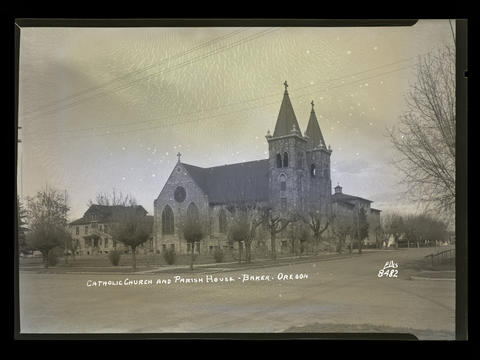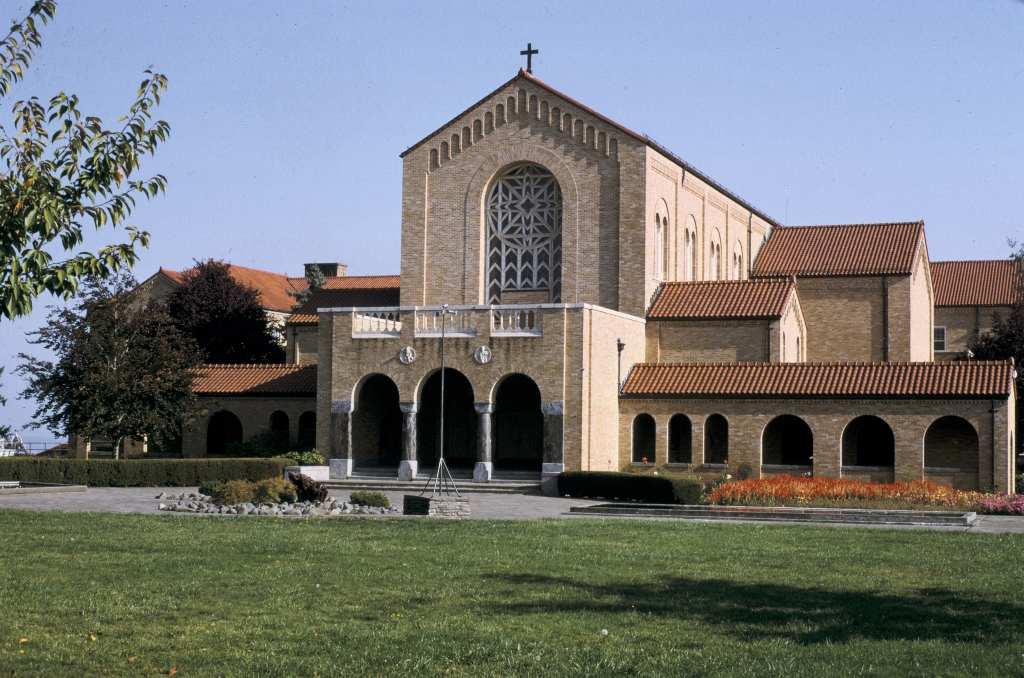Elden Francis Curtiss, the only native-born Oregonian who attained the episcopal office of archbishop in the Roman Catholic Church, was a leader in renewing seminary education in both the state and the nation.
Born in Baker on June 16, 1932, Curtiss was the eldest of four sons born to Elden F. and Mary A. Neiger Curtiss. Educated from elementary through high school at Baker’s St. Francis Academy, he took his undergraduate degree from St. Edward Seminary College in Washington State. He received his master of divinity degree from St. Thomas Seminary in Kenmore, Washington, and a master of arts degree from the University of Portland. Curtiss subsequently received honorary doctorates from the University of Portland and Mount Angel Seminary in Oregon; Carroll College in Helena, Montana; and Creighton University in Omaha, Nebraska.
On May 24, 1958, Curtiss was ordained to the priesthood for the Baker Diocese at St. Francis Cathedral by Bishop Francis P. Leipzig. He was appointed assistant pastor at Lakeview and subsequently was assigned to LaGrande, where he served as hospital chaplain and campus minister at Eastern Oregon State University. He was the pastor in Jordan Valley before joining the faculty at Mount Angel Seminary in July 1970 and was appointed the first non-Benedictine president-rector at Mount Angel on January 1, 1972. He also served on a national committee that drafted the second edition of the Program for Priestly Formation for seminaries in the United States and was named an outstanding educator in the United States in 1975.
On April 28, 1976, Curtiss was ordained Bishop of Helena, Montana. During his episcopacy there, he was chancellor of Carroll College, a member of the board of trustees for the University of Portland, and chair of the U.S. Bishops Committee for Vocations to the priesthood and religious life. He also served on the administration committee for the U.S. Conference of Catholic Bishops and was elected the first chair of the Bishops’ Committee for Native Americans.
Curtiss was appointed archbishop of Omaha, Nebraska, in June 1993. That same year, he was selected as episcopal advisor for Serra International, a worldwide organization of lay people who support Catholic seminarians and priests. Under Archbishop Curtiss, Catholic elementary and secondary schools in Omaha flourished and religious vocations grew. His rural Oregon roots were expressed in his service as a consultant to the United States Conference of Catholic Bishops Committee on Marriage and Family Life. In 2001, he was named to a fifteen-year membership on the Vatican’s Pontifical Council for the Family by Pope John Paul II. In 2008, his contributions to the Catholic Church were formally recognized in a letter from Pope Benedict XVI.
Archbishop Curtiss’s theological thinking has been informed by insights drawn from phenomenology, but his philosophical and theological roots remain firmly planted in the thought of St. Thomas Aquinas. Thus, in the tumultuous aftermath of the Second Vatican Council (1962-1965), he understood and promoted the council and its documents in accordance with the interpretation of continuity rather than discord and rupture.
Curtis saw and promoted reforms through the lens of ressourcement, which meant he believed in a return to traditional Catholic intellectual and spiritual sources. He has a deep interest in the interaction between faith and culture to make Catholicism relevant to the modern world while safeguarding the Catholic tradition.
In 2009, after fifty-one years as a priest and thirty-three years as a bishop, Curtiss retired. As archbishop emeritus, he lives in Omaha but continues to think of Oregon as his home.
-
![]()
St. Francis Cathedral in Baker City, c.1946.
Oregon Historical Society Research Library, Digital Collections, Org. Lot 1275; Box 1; 8482
-
![Mt. Angel Abbey Chapel, Sep. 1992.]()
Mt. Angel Abbey Chapel, Sep 1992.
Mt. Angel Abbey Chapel, Sep. 1992. Photo Stanley W. Bryan, Univ. of Oreg. Libraries, Architecture & Allied Arts Library, Building Oreg.: Architecture of Oreg.
Map This on the Oregon History WayFinder
The Oregon History Wayfinder is an interactive map that identifies significant places, people, and events in Oregon history.
Further Reading
O’Connor, Dominic and Gaire, Patrick J. A Brief History of the Diocese of Baker. St. Benedict, Ore.: Benedictine Press, 1966.
Schoenberg, Wilfred P., S.J., A History of the Catholic Church in the Pacific Northwest 1743-1983. Washington, D.C.: The Pastoral Press, 1987.
Stone, Msg. William S., The Cross In The Middle Of Nowhere: The History of the Catholic Church in Eastern Oregon. Bend, Ore.: Maverick Press, Inc., 1993.


